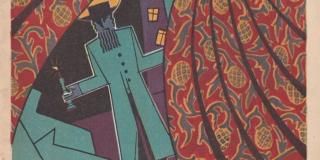
Ha-tsofeh ba-arets ha-ḥadashah
Zvi Hirsch Bernstein, 1846–1907 (Editor)
Ha-tsofeh ba-arets ha-ḥadashah (The Observer in the New Land)
New York, ca. 1871–76
Ha-tsofeh ba-arets ha-hadashah (The Observer in the New Land), the first Hebrew-language periodical in the United States, was published by the writer and editor Zvi Hirsch Bernstein in New York from 1871 to 1876.
Bernstein was born into an affluent family in Lithuania and received a traditional education. As an active advocate for the Jewish Enlightenment movement, he began contributing articles to the Hebrew maskilic periodicals in Lithuania during his 20s, establishing his reputation as an intellectual writer early in life. Bernstein continued to work as a correspondent for the Hebrew press in Europe even after he immigrated to the United States in 1870, when he was 24. In 1871, he founded the Yiddish periodical Di post (The Mail). High-quality fonts of Hebrew letters were not available in the United States, so instead Bernstein used fonts from Vienna and Vilna, which he brought to America, eventually setting up his own printing shop in New York. While Di post was not a successful undertaking, the Hebrew newspaper he founded, Ha-tsofeh ba-arets ha-hadashah, was prosperous and popular. It offered high-quality journalism in Hebrew, a novelty in the United States at that time.
This weekly newspaper maintained a high standard of reporting, focusing on Jewish and general issues of local and international interest. It also frequently republished articles from European Hebrew periodicals. The particular issue from April 12, 1872, displayed here features an article discussing the establishment of shelters for the pious poor Jewish people in Jerusalem.
The New York Public Library believes that this item is in the public domain under the laws of the United States, but did not make a determination as to its copyright status under the copyright laws of other countries. This item may not be in the public domain under the laws of other countries. Though not required, if you want to credit us as the source, please use the following statement, "From The New York Public Library," and provide a link back to the item on our Digital Collections site. Doing so helps us track how our collection is used and helps justify freely releasing even more content in the future.






